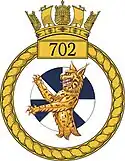702 Naval Air Squadron
702 Naval Air Squadron (702 NAS) was a naval squadron of the Royal Navy's Fleet Air Arm. It was based at RNAS Yeovilton in Somerset and earlier at RNAS Portland in Dorset. As a training Squadron it trained all ground and air crew for the sister front-line maritime Lynx squadron, 815 NAS[1]
| 702 Naval Air Squadron | |
|---|---|
 702 NAS Badge | |
| Active | 1936-1952, 1978-1 August 2014 |
| Country | United Kingdom |
| Branch | Royal Navy |
| Type | Training Air Squadron |
| Role | Training and Fleet Air Arm Maintenance |
| Part of | Fleet Air Arm |
| Garrison/HQ | RNAS Yeovilton |
| Motto(s) | Cave Ungues Felis "Beware the Claws of the Cat" |
| Equipment | Westland Lynx HMA.8 |
| Commanders | |
| Current commander | Not in Current Naval Service |
| Ceremonial chief | HRH Queen Elizabeth II |
It merged with 700(W) NAS to form 825 NAS.[2] 702 NAS disbanded on 1 August 2014.[3]
History
Formation and WWII (1936 - 1945)
702 NAS was founded on 15 July 1936[4] to operate aircraft from the ships of the 2nd Battle Squadron. Operating Supermarine Walrus and Fairey Seal aircraft from its base at RAF Mount Batten initially, later these were replaced by the Fairey Swordfish float-plane. Granted Squadron status in 1939, and briefly disbanded in 1940, 702 Naval Air Squadron reformed as a Long Range Catapult squadron with Fairey Seafoxes for duty in Armed Merchant Cruisers for much of the Second World War.
Naval Jet Evaluation Training Unit
In 1949 the squadron reformed at RNAS Culdrose as the Naval Jet Evaluation Training Unit. Equipped with four de Havilland Sea Vampires, it also became the first unit to fly the Gloster Meteor and was the first unit to achieve jet landings at night on a carrier, embarked in HMS Implacable and HMS Theseus. The squadron was renumbered as 738 Naval Air Squadron in 1952.
Aircrew and Maintainer training squadron (1978 - 2014)
702 was reformed in 1978 and has since operated the Westland Lynx HAS2, HAS3 and HMA8. The squadron is tasked to provide aircrew training and maintenance personnel for the Maritime Lynx, ready for ship's flights. It has a complement of around 160 aircrew and maintainers with approximately a further 20 aircrew and 115 maintainers in training per annum also providing refresher training for an additional 30 aircrew.
In 1981 these roles were split and the parenting duty became the charge of 815 Naval Air Squadron. The following year both squadrons relocated to RNAS Portland for a period of eighteen years before returning to its current location of RNAS Yeovilton in 1999.
702 NAS disbanded at a ceremony held at the Royal Naval Air Station Yeovilton on 1 August 2014. Its aircraft transferred to 815 NAS and its personnel transferred to either 815 NAS or 825 NAS.
References
- "702 Naval Air Squadron | Royal Navy". Archived from the original on 4 October 2011.
- "The Lynx Wildcat evolution - Royal Navy". www.royalnavy.mod.uk. Retrieved 21 April 2018.
- "Flying with wings and fond farewell at 702 Naval Air Squadron - Royal Navy". www.royalnavy.mod.uk. Retrieved 21 April 2018.
- "History of 702 NAS at the Royal Navy website". Retrieved 3 February 2010.